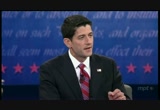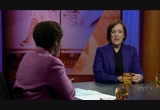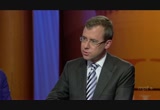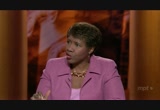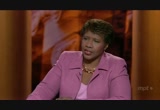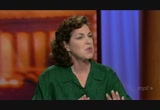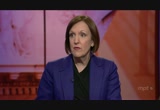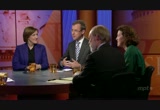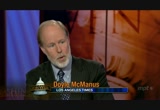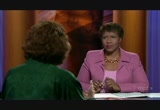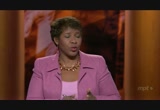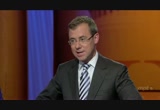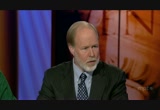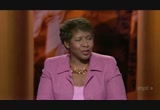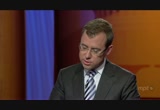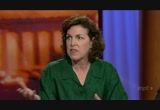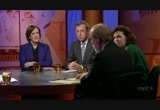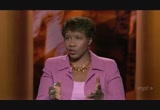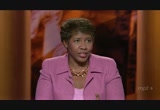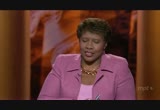tv Washington Week PBS October 12, 2012 9:35pm-10:00pm EDT
9:35 pm
mean. gwen: paul ryan. joe biden. run being mates with but a single goal. to paint the other one as unreliable. >> they got caught with their hands in the cookie jar. turning medicare into a piggy bank for obamacare. what we are witnessing as we turn on our television screens these days is the absolute unraveling of the obama foreign policy. >> with all due respect, that's at that bunch of malarkey. folks, use your common sense. who do you trust on this? gwen: a lively debate for both sides. >> not mathematically possible. >> it is mathematically possible. it's been done before. it's what we're proposing. >> it has never been done before. >> it's been done a couple of times actually. jack condition did i lowered tax asks increased growth. >> now you're jack kennedy. >> ronald reagan -- gwen: what won? style or sush stance. breaking it down for us tonight. doyle mcmanus of the "los angeles times." alexis simendinger of real clear politics.
9:36 pm
karen tumulty of "the washington post." and jeff zeleny of "the new york times." >> award winning reporting and analysis. covering history as it happens. live from our nation's capital, this is "washington week with gwen ifill." produced in association with "national journal." corporate funding for "washington week" is provided by -- >> we know why we're here. >> to connect our forces to what they need when they need it. >> to help troops see danger. before it sees them. >> to answer the call of the brave and bring them safely home. >> around the globe, the people of boeing are working together to support and protect all who serve. >> that's why we're here. >> this rock has never stood still. since 1875, we've been there
9:37 pm
for our clients through good times and bad. when their needs changed, we were there to meet them. through the years, from insurance to investment management, from real estate to retirement solutions, we've developed new ideas for the financial challenges ahead. this rock has never stood still. and that's one thing that will never change. prudential. >> additional corporate funding is provided by norfolk southern. additional funding is provided by the annenberg foundation, the corporation for public broadcasting, and by contributions to your pbs station from viewers like you. thank you. once again, live from washington, modiator gwen ifill. gwen: good evening. there's this hole. your candidate dug it and it's up to the number two guy to diagnose you -- dig you both
9:38 pm
out. the other, the polls are teetening, wind at your back and up to his number two to make sure it stays that way. thasks the task facing vice president joe biden and congressman paul ryan last night. they settled on basically the same approach. arguing the other ticket is not to be trusted. in this exchange, the two sparred about medicare. >> this is a plan that's bipartisan. it's a plan i put together with a prominent democratic senator from oregon. >> there's not one democrat who endorses it. >> our partner is a democrat from oregon. >> and he said he no longer supports it. >> we put it together with the former clinton budget director -- >> who disavows it. gwen: president obama and governor romney continued that theme of untrustworthiness on the campaign trail this week with the president hammering romney on promised tax cuts. >> after running for more than a year in which he called himself severely conservative, mitt romney is trying to convince you that he was
9:39 pm
severely kidding. gwen: and romney is raising questions about what the administration knew about the deadly attack on the u.s. consulate in benghazi, libya. >> there are more questions that came out of last night. because the vice president directly contradicted the sworn testimony of state department officialings. he's doubling down on denial. gwen: so karen, is this coming down to a game of who do you trust? >> i think it is. and it's also coming down to a game of how each one of them defines the other. and with mitt romney, i think we've seen something pretty extraordinary over the last week and a half. starting the day before the last debate. where he is once again sort of very visibly kind of trying to position himself at least in tone and in emphasis, much more toward the middle. gwen: jeff, is this part of the overall strategy for both sides to do this? not to position to the middle
9:40 pm
but to find some key way of driving in and making the point that they -- that the other guy is not working? >> it is. and it's -- everything that's happening right now is about leadership. i mean, we're talking about benghazi and we're talking about the foreign policy. but really, what governor romney and congressman paul ryan are trying to do is have people sort of throw everything in a basket. the economy, other things. and just overall urge voters to have a second look at the leadership that this administration has. and are they in control? are they in charge of things? what vice president is trying to do, you know, he was hectoring and interrupting and interjecting and he was trying to jolt voters, i think. and saying hold on. democrats, maybe some independents who might have been swayed last week to push them in the middle. there aren't that many people who are these undecided voters. i spent several days in ohio this week. and it's really hard to find someone who hasn't made up their mind. at least attending the rallies
9:41 pm
and even at coffee shops. so it's all right now about building up their bases. and meantime, the ground campaigns for both sides are trying to find these undecided voters and try to reach out to them through tv ads and other things. all about leadership, i think. at this point. gwen: all about leadership. let's take one -- take this apart one by one. taxes, doyle. one of the things they were -- will argue about is who will cut your taxes and raise your taxes. how do we see this play out on the stage at the debate last night? in a way that it mirrors what we've been seeing on the campaign trail? >> well, you had a serious debate over taxes. one of the things i think jeff is absolutely right. that debate between the vice-presidential candidates was about reaffirming the argument of each side's partisan base. if the word "bipartisan" was spoken during that debate, i missed it. gwen: no. it was spoken. but it was spoken by paul ryan. making the case that that's how they can solve problems. >> arguing that it could be bipartisan but paul ryan was
9:42 pm
actually going back to the republicans' 2010 playbook. where it was all about lower spending and tax cuts. joe biden was sticking to the -- the attack line of the obama campaign which is that mitt romney's tax cuts don't work. he must be hiding some details. he's trying to pull the wool over your isles. gwen: all this came back to one basic thing which you can't trust the other guy. the first part of the debate was devoted, alexis, to a story you were covering this week on capitol hill as well as last night's debate which was what happened at the consulate in benghazi. and the administration has had some shifting explanations. >> a month away from the attacks on the anniversary of 9-11. and we still were hearing this week more questions than direct answers. and it has taken a long time for the administration to come around to suggesting two things. one was that their intelligence may have been flawed and not anticipating any kind of attack. and secondly, the intelligence was flawed maybe in interpreting what had happened
9:43 pm
during the attack. and so the hill, in a partisan way, was exploring what was happening both in security, the funding and the decision making that went behind the security for the consulate. but it all came down to this idea can you trust the administration? to give us the straight information. are they playing politics with something this serious, the death of four americans? it was up to the vice president to try to counter that. and he got himself into a hole that the white house was digging him out of. today. by suggesting he wasn't trying to say that the entire government didn't know about the security questions. whether there should be more or less security. he was trying to suggest that the president and he had not been directly advised of these requests for additional security assets. in benghazi. gwen: and yet we've seen mitt romney and paul ryan continuing to talk about this every single day. which is interesting. because we are told that americans aren't voting on foreign policy issues. and yet here is one that won't go away.
9:44 pm
>> it's interesting also because this issue is -- is an issue that until quite recently, president obama had a huge lead against -- gwen: you were saying osama bin laden and the conversation would end. >> the polls do suggest they are chipping away at that. it's an interesting strategy, though, because as one republican strategist who's worried about it told me, when you start playing on those issues, you are playing on the commander in chief's turf. and the only time that that has ever really worked and made a difference in an election was with jimmy carter. gwen: and one of the things that joe biden was trying to do was to get back at that is to put the grinning and the smiling and the condescension was to try to say i know this guy. you can back up on this. and even on domestic issues, like the stimulus. which the republicans have always criticized. he was saying hey, butty, you asked for money, too -- buddy, you asked for money, toofment >> and almost read the letters that the congressman read and
9:45 pm
looking for funding for a project in janesville or something. then he also said hold on. the house budget that you all passed would eliminate some of this funding. so at every turn last night, the vice president used all of his savvy and skill from his time on capitol hill. to me, it seemed like a couple of -- sort of a committee hearing with just -- someone from the house and the senate, i guess a conference committee of two if you will. the gentleman from delaware and the gentleman from wisconsin. and they went after it so hard. but i think that -- gwen: and thanks to martha raddatz. >> kept it moving along. gwen: where martha could say be specific. >> in this congress we might need here. the vice president was pretty skilled at sort of shutting this argument down. at every turn. but the condescension i think is you're right. it's still going to settle in as karen wrote this morning, and we need a few days to see sort of how this plays out. but by then there will be another debate. so this one will not have a
9:46 pm
lasting effect but it gave the president some more time which he desperately needed. gwen: gaffe him some breathing room after a very -- gave him some breathing room after a very bad week. and are you ready to be president? usually that's how we judge vice-presidential candidates. the heartbeat away question. but it really wasn't a directly asked or answered question. >> it wasn't. and martha, did not put that question directly. and i haven't talked to her about this. but i have a theory as to why. that is a question that inherently would favor joe biden who's been in the white house for four years. it would inherently put paul ryan on the back foot as they say in soccer. how do you prove that you're ready to be president? and the other gsh joe biden, i've been in the national security council meetings and been to afghanistan more times. and on that measure, i actually think paul ryan acquitted himself very well. you did not walk away from that debate thinking as was possible incidentally after his convention speech, in tampa, thinking, this guy isn't quite ready. this guy is a little rattled. this guy wasn't on top of every
9:47 pm
piece of his brief. gwen: is that possibly because this debate wasn't about either of them? it was really about the guys who weren't in the room? >> exactly. i came away feeling that vice president biden's mission was not necessarily to create an aura that paul ryan was not ready to be but that mitt romney is not ready to be president. and i felt that he was very much trying to use ryan as a proxy for the person who was not at the table which was exactly what you're supposed to do in a vice-presidential debate. but they were both talking about the top of the ticket. and that i thought was a very interesting thing to watch. because the strategy that the obama team has been using was just blanketed right over paul ryan in terms of combating mitt romney's varatay, his qualifications, his ability to direct policy, all of it. >> i also think that even though paul ryan is young, looks young, the fact is that he has -- he's an intellectual
9:48 pm
force in his party. he is a committee chairman. i just don't think that question has been raised and batted about him as much as it was say with sarah palin four years ago. it was a totally different dynamic. on the stage that you were four years ago. where one person was there sort of trying to prove that she belonged there. and i don't think -- gwen: and joe biden was trying to prove that he was not going to beat up on the girl essentially. he knew he had a reputation for being a bully. just like he had a reputation last night for being gaffe prone. and he didn't really make any big gaffes. >> can i say, though, what's easternic about the whole thing is yes, he's -- ironic about the whole thing is yes, he's being known as gaffe prone, he was on the split screen laughing and grinning. and interrupting. it was -- gwen: for many years, we've had two debates in a row in which the democratic candidate seems to fall victim to it. >> i think some of it was
9:49 pm
intentional. i think there were so many democrats out there who are clamoring for we want to take the fight to them. but in doing so, i wonder if he sort of raised the bar a little bit for the president next week. no one is voting specifically for the vice president. i don't think a presidential candidate per se can get away with necessarily all the smiling and the aw, shucks. but the next debate, which is a town meeting next tuesday, the president seems to me has even higher expectations now. because no matter what he does, he's not going to be quite as saucy as his vice president or as sharp as his vice president. so it -- i wondered if it made the president look a little bit weak. we'll have to see how he does next week. gwen: only a few days to wipe this one out. >> the town hall format is suggesting that their facial expressions or their emotion has to be directed toward the people in the audience and their questions. and that's a challenge for president obama and for mitt romney. >> and they have to actually answer the questions. when they're asked by an
9:50 pm
ordinary american as opposed to by a media moderator, i think -- try to play games with the question. when it comes to you from a moderator. gwen: shockingly. sometimes they don't answer the moderator's questions. >> you can't get away with that in a town hall format because it looks disrespectful of the person who's asking. >> the other challenge is to connect with the voter. thrs the challenge for mitt romney -- this is the challenge for mitt romney who the rap is he's too far away from the average voter. he can't quite connect. gwen: most famous town hall, at least one i remember the most is the one in which there were three people on stage. bill clinton, ross perot and george h.w. bush. and he looked at his watch. >> the important part of that was before he looked at his watch, he misunderstood a question from a voter he -- she phrased it awkwardly about the national debt. bush kind of bobbled the question. and bill clinton walked over and said i think i understand what you're talking about. and he did. gwen: and the other one in which george w. bush on stage
9:51 pm
with al gore and al gore crowded him and gave him had th look and what are you doing here and moved on. it was very smooth. i find these debates to be interesting. one thing presidential candidates don't do that the presidential candidates do is sit down. they stay at their podium and that changes the nature of the discussion it seems to me. >> and makes the eye rolling and all of that more easier because you're siterring at a much more intimate setting with the vice president. gwen: so the president acknowledged it took him a couple of days that he had a terrible debate last week. he's acknowledged it in a couple of different ways and took him a while to make fun of it. does he have a strategy? was the vice-presidential debate part of the strategy to get on track? if anything else, they gave away a week's momentum. >> i think it was designed exactly like that. it's one of the reasons that david axelrod, the president's senior advisor, was spending all this time this week with the vice president today. this is part of the rebuilding strategy. and part of the president's first acceptance that he had a weak performance and he kind of
9:52 pm
kept adding on day by day by day. that was a recognition from donors specifically i'm told and from supporters that he has to acknowledge this publicly that he didn't do very well. that's not something that this president does all that often. sort of acknowledge so bluntly that he had a problem here. but i think going forward, they do believe the clock now is sort of -- or the match is sort of reset. and for all that talk and consternation about this among democrats, what they're most heartened by, what chicago, the headquarters is most heartened by are these battleground states. things haven't moved as much as the national polls have. because the odds have been playing -- the ads have been playing in these laboratories of democracy, ohio where tons of ads going back and forth and hasn't shifted. a couple of polls this week where it closed a tiny bit. but not -- it's just almost outside the margin of error. the romney campaign realizes if -- they still have work to do in all-important ohio. >> there is one outlying poll in florida that does suggest a big shift down there.
9:53 pm
and again -- >> almost too big of a shift. i talked to a romney advisor who said we're not up seven points. gwen: don't scare us like that. i wonder whether -- where whether we are right before the conventions. and we're going to stay there? >> in fact, the obama campaign said that this week. when you were saying it lost a week, in fact, they were sort of suggesting that in the national polls it had tightened to the point where it was before the convention. if you think about that, and lost a month. more than a month. so they were acknowledging that. at least. i thought that was very interesting that they were trying to say that their argument is that mitt romney does not have enough time to make up the gap in the battleground states that jeff is talking about. and that is -- it sounds like a hail mary wish on their part. >> four out of five days in ohio he's not done that much campaigning for a long time. this is governor romney. he's waking up there on saturday. and he is -- really fighting for this. so i think there may be enough time. even though people are voting as we speak, the crowds and other things, the enthusiasm is there for -- on both. >> and shows up in the polls.
9:54 pm
the enthusiasm. >> and are we going to stay right where we are? well, i think actually in the last week or 10 days, we learned the answer to an old political science question. that is, do campaigns matter? do messages matter? gwen: and? >> they sure do. one really bad debate performance by the president combined we should remember with a quite masterful debate performance by governor romney did move a lot of numbers around. and that's why it was so important that joe biden stop the momentum in that direction. and everybody's favorite analogy this week was this is like a major league baseball team. it's ok to drop the first game. but if you go down two games in a row, you're in serious trouble. gwen: i wonder why we had baseball analogies. i can't imagine. go nats. and i still want to ask the question about what these candidates do about this? if they know they're neck and neck and got three weeks to go, and they know that two debates in those three weeks, how do you start strategizing, what
9:55 pm
are they doing, what's different? >> the obama campaign, what they say is that this is always been a football game. that's going to be won by a field goal. not a touchdown. they are working very hard on their ground game. they are supremely confident in their ground game. again, as doyle said, people are already voting. and so i think in the end, that's where the money and -- is going to go. gwen: one of the interesting questions toward the end of the debate last night was about abortion. the catholicism of the two candidates who had an opportunity to explain where they stand and how that clashes or is orvet of their religion. -- observent of their religion. and it seemed to me they were being asked to speak to a swing voter group which is very important to them. which is women. young women. of childbearing age. who are paying very close attention. >> we're going to see that answer replayed. or we may not see it. but through direct mail, through targeted online
9:56 pm
advertising, to women and other things, the obama campaign, that they have a new opportunity here with congressman ryan's sort of suggestion that i think he said something like we changed these laws through democratic processes or something. so meaning that there could be some type of a law. a change coming up here. so in the whole suggestion of the supreme court, which really hasn't been a big topic of discussion. all these conversations are going on in sub groups. so that is what's going on right now. is sort of this microcampaign. they know exactly, specific areas of interest for each voter and that's why they've been microtargeting things and things going on which we can't even see. gwen: and talking a lot about the future of the supreme court. which you don't hear a lot of on the stump. >> the big hit they took in the polls was based largely on a big swing by women voters. and those -- they know that they have to win -- they're going to lose men. so they are going to have to win women by pollsters tell me
9:57 pm
53% or higher to win this election. >> and also don't forget that just a week ago, governor romney to the des moines register was trying to obscure his position on abortion a little bit. he said he didn't have a lig bethive -- a big legislative program. gwen: was this responding to the ryan problem? >> ryan put it back where he thought it needed to be. he reclarified a position that maybe governor romney for a couple of minutes there didn't want to be so clear. but then romney ran into trouble with some people in his own base. >> and they don't agree. they have not agreed entirely with one another. and so ryan also affirmed my position is the nominee's position. >> the romney campaign, fine with a little bit of confusion out there. and confusion is good. but the first phone call that governor romney made i'm told after he met with the des moines register's editorial board was to tony perkins. a leader in the pro-life movement. and saying i'm -- i'm with you. i am still 100% pro-life. etc. so i think that -- but they're fine with the confusion on
9:58 pm
this. we'll see if voters are. it's the burden of the obama campaign to maximize the opportunities of this confusion. gwen: jefferson county, colorado, famous swing county in a swing state, talking to swing voters, earlier this week, and i talked to a woman, the elusive undecided voter. and she said to me, i kind of -- a young woman, 11 month old child and runs a small business with her husband. and she said i really like what it is that the president says about women. but i like what governor romney said about small business. i truly cannot decide yet until i do more research. which is what they say when they haven't been paying attention. but she plans to vote. now, do these campaigns focus on someone like her? or they just focus on keeping their bases energized? >> i think both. at the same time. and this is -- gwen: this is colorado. >> this is not a one track operation. i think they have to do both. >> and that's not at all an unusual pattern. karen and i were both watching a focus group that peter hart did of undecided voters in ohio this week. and there was a lot of on the economy, i really like what
9:59 pm
governor romney is saying. but on all these other issues, health care, women's issues, abortion, he seems awfully conservative. couldn't we have a combination -- gwen: no, you can't have a combination. >> it's a choice. >> wufrnt things that doyle is mentioning -- one of the things that doyle is mentioning and pollsters have suggested president obama needs to be more articulate in these debates about what his vision is. there still isn't that hurdle crossed. gwen: we'll talk about what we think the president will have to do in his -- in this debate coming up next week. in our webcast. thank you all very much. only 3 1/2 more weeks until election day. some of you are even voting now. how will you keep up? join me every night on the pbs newshour and for special coverage of the second presidential debate tuesday night in hempstead, new york. read what our panelists are writing. you can find their stories at the essential read section of our website. and next thursday at 2:00 p.m. eastern time, join me for a live chat. i'll answer anything you ask. within
166 Views
IN COLLECTIONS
WMPT (PBS) Television Archive
Television Archive  Television Archive News Search Service
Television Archive News Search Service 
Uploaded by TV Archive on

 Live Music Archive
Live Music Archive Librivox Free Audio
Librivox Free Audio Metropolitan Museum
Metropolitan Museum Cleveland Museum of Art
Cleveland Museum of Art Internet Arcade
Internet Arcade Console Living Room
Console Living Room Books to Borrow
Books to Borrow Open Library
Open Library TV News
TV News Understanding 9/11
Understanding 9/11


